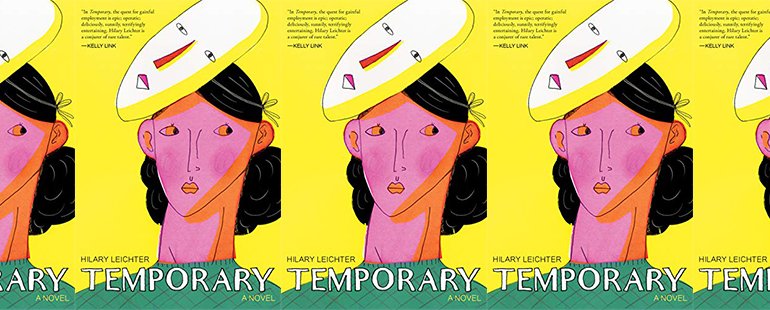Contemplating Infinity

The list of novels that relate the true nature of unemployment is very short. I know because I’ve spent ten years writing my own novel of the experience of long-term unemployment while simultaneously searching for another book that could echo back to me what I felt. I’ve read books that convey various aspects of unemployment—the primal torture felt by Raskolnikov in Fyodor Dostoevsky’s Crime and Punishment, the decadent self-actualization performed by the narrator in Ottessa Moshfegh’s My Year of Rest and Relaxation, the apathetic slide into decrepitude of George Hurstwood in Theodore Dreiser’s Sister Carrie, the encroaching financial calamity in Eric Puchner’s Model Home, the youthful aimlessness of Esther Kohlers in Leigh Stein’s The Fallback Plan, or the haunted horror born of listlessness pervading Rainer Maria Rilke’s The Notebooks of Malte Laurids Brigge—but none of them capture the true anguish of living inside such existential uncertainty, and more terrifying, the potential infinity of it. And then I read Temporary.
Hilary Leichter’s debut novel, Temporary, is a shifting, surrealist tale of a young woman’s search for permanent employment, a personal nirvana termed The Steadiness. “I’ve heard that at the first sign of permanence, the heart rate can increase, and blood can rise in the cheeks . . . . ‘When you know, you just know,’ the lucky temps say. ‘You can’t rush these things.’” It was difficult at first to get my bearings in the novel: the protagonist is unnamed, the location is scantily described, and the sentences in the opening sections are vague and uncanny, referring to the woman’s temp agency as a pleasure dome doling out thin slices of existence. But the action briskly moves from a high-rise office to a pirate ship to a murder shack to a witch’s cave as the woman’s placements become increasingly bizarre and less promising. It’s not a novel about unemployment per se, as the woman bounces from job to job, but the dread of unemployment is the monster always hunched in the shadows, and the tenuousness of her job situation is brought to hilariously literal heights. For the most part, the woman reacts with little emotion to the calamities that strike again and again, as maintaining composure is one of the requirements of being a successful temp. Remaining detached, assuming the identity others demand of her, and resigning herself to a fate of permanent impermanence are also required of the woman and, we realize with some horror, of us, as we increasingly see ourselves and our modern economy in the narrative, echoes of Marx’s theory of alienation resounding behind every page. “There is nothing more personal than doing your job,” the woman is told, an eerie bit of corporate gaslighting one might expect from a recruitment ad for any number of gig economy jobs.
An origin thread runs through the novel as well, describing how the gods created the First Temporary employee so that they could take a break. The First Temporary was a being who fell from a meteor and was subject to ambition-less drift, back before gravity, “back when employment was the only kind of honest weight you could apply to a life.” And it is this exquisite reflection on our relationship to the work we do and the life we desire that really struck me as one of the most accurate things I have ever read.
I’d had two good bouts of unemployment before the big one: six months of joblessness after I finished undergrad and, two years later, another agonizing three months following a cross-country move. But the big one, the big biggie, was after I’d gone back to school for a master’s in business—an attempt, I’d reasoned, at landing a more lucrative and permanent role. I graduated business school in the winter of 2008, mere weeks after the collapse of titans like Countrywide and Lehman Brothers. The world looked upside down from what it had been eighteen months earlier when I’d begun my degree.
But as bad as things seemed, I felt I was well-prepared at the dawn of 2009: I was smart, determined, and hard-working, and I had a degree in a practical field. I updated my résumé, filled my calendar with informational interviews and networking mixers, and told myself I’d have something by spring.
This is, of course, when a narrator would come in and say in perfect deadpan: Elizabeth did not, in fact, have anything by spring.
I lost count at some point, but in 2009 I estimate I applied for between three and four hundred jobs and got nothing, nada, diddly bupkis. I got turned down for a part-time receptionist job, ditto for a waitressing shift, as well as hundreds of entry-level jobs at everywhere from Craigslist to Art.com. Albert Einstein supposedly said insanity is doing the same thing again and again hoping for a different result, and yet for the young and under-networked, that is precisely what a job search is: scroll the listings, customize the résumé, personalize the cover letter, seek a personal connection on LinkedIn, fill out the form, send the email, breathe a silent wish, and repeat. Occasionally a pellet drops out of the chute and someone will request a phone interview. Most of the time no pellets drop out of anywhere and you forget where the chute even is, but you keep pushing the lever all the same. You have to keep pushing the lever.
Communicating what unemployment feels like eight months in, or ten, or twelve, is difficult because it feels like different things at different times of the day: hope at nine, anger at ten, despair at eleven, panic at twelve, acceptance at one, cynicism at two, defeat at three, and a late-breaking good idea for a new blog at seven-thirty, with the cycle shuffling and repeating the next morning. I’ve felt many of these same emotions over the last few months under quarantine. Friends ask how I’m doing and my answer is always different, my emotions stretching like taffy between the poles of morning coffee and evening wine. Metaphors brush against the sides of the experience but they too fall short: it’s like being a cork bobbing in an endless ocean, it’s like throwing infinite pennies down a wishing well, it’s like being slowly eaten by an animal that never quite kills you. The reason that unemployment is so difficult to describe is that it is boundless, that once inside it you realize it could literally go on forever. And confronted with infinity, the human mind offers little framework for understanding.
“The Immortal” is one of Jorge Luis Borges’ most celebrated short stories, famous for its depiction of immortal humans as Troglodytes, “naked men with grey skin and neglected beards” living in hundreds of shallow holes dug in the sand. It’s an arresting image, hardly the golden-robed gods one might imagine. But the reason they spend eternity lying in the sand is quite simple: the immortals realize it is only death that makes men precious. Absent a terminus, their lives were wholly lacking in shape or meaning. All things would happen to all of them, and in the face of infinity no one is someone, and one immortal man is all men. “Every act (every thought) is the echo of others that preceded it in the past, with no visible beginning, and the faithful presage of others that will repeat it in the future, ad vertiginem.” Immortality in this case is a curse, and the only thing to do with infinite time is to do nothing at all.
It is exactly this torture that I found myself confronted with daily during my long unemployment in 2009. Barring activities that cost money, I could do anything with my day: I could sleep, I could watch television, I could walk the length of San Francisco Bay, I could apply for jobs, I could go to yet another Pink Slip Mixer, I could flip a coin for ten hours straight, start another blog, pull the seeds off a strawberry… But as the weeks turned into months turned into seasons the desire to do anything waned simply because my time and my choices were without limit and without consequence.
Translating this experience into fiction was a daunting task. Things have to happen in a novel, and unemployment is largely defined by the absence of things happening. Actions have consequences in a story, and yet in a prolonged job search, you have little to no control over your situation, and attempts at achieving impact will be largely fruitless and ignored. I suppose a small readership could exist for a novel consisting of a young woman sending résumés out for two hundred pages, but I don’t think I’d like to read it. In order to tell my story, I had to craft ancillary arcs, presenting unemployment as the primary conflict only to have my protagonist realize that her problems actually lie elsewhere. When the book opens, she has lost a job on Wall Street and is already many months into her unemployment, with much of the day-to-day action of applying for jobs occurring offscreen. She has unknowingly begun a journey to figure out what she finds meaningful in life, and it is this search that gives the novel its shape.
In my memories, my own long-term unemployment feels like time spent in a holding pattern. In ten years, I’ve forgotten almost nothing of the experience, and how keenly I felt the crisis of knowing I couldn’t get a job in finance but having no idea what I should do instead. Now, when I look at those months within the larger framework of my adult life, it seems I’d also unwittingly begun a journey to figure out what I found meaningful in life, though I wouldn’t get the answer until much later.
While writing my novel I read books with unemployed characters, trying to understand how to give a shapeless story shape, but nothing I read exactly matched my experience or what I was trying to achieve on the page. Now, after reading Temporary (and having watched its creepy Oakland cousin, Boots Riley’s masterful Sorry to Bother You), I think that perhaps the best language to convey the experience of unemployment is that of surrealism. When Leichter’s protagonist is ordered to kill someone as part of her job, and when the ghoulish plot to genetically engineer the perfect worker is uncovered in Sorry to Bother You, the audience is shocked not at how far-fetched these scenarios are, but how inevitable. Surrealism allows the artist to envision a vividly grim future by shining light on the seeds of that future planted in the present. And you get no better vantage point for seeing the inhumanity at the heart of the modern economy than being outside of it.
Leichter endows her protagonist with a sense of immortality by linking her to the First Temporary and, like the naked sand-dwellers in Borges’ story, by forbidding her character’s life to take on any meaningful shape. When Leichter speaks of employment applying honest weight to a life, I understand her to mean that the occupation we choose for ourselves prevents us from drifting into the immortal coma of doing nothing because you could conceivably do anything. I’m speaking not only of best-case-scenario employment—those people lucky enough to know which career they want and actually get to work in their chosen field—but I’m also speaking about those people who choose to raise children full time, or grow orchids, or race motorcycles, or protect the unprotected. Pursuits turn into honest weights and eventually give life meaning. And life without meaning would look a lot like shallow holes dug in the sand.
I never did get a job. I temped at a school and a nonprofit and got pregnant and had no career to leave and thus ended up becoming a full-time mother. The Steadiness that I thought awaited me after graduate school was not to be. But my unemployment during the Great Recession was the defining event of my adult life, more than going to college, marrying, or even having children. The fifteen months I spent looking for a job permanently changed who I am. I changed political parties, decided to finally take a serious stab at writing, started a family, and saw the parameters of my life forever redefined. I was lucky—incalculably lucky—that my husband was able to find a job after his own eleven-month bout of unemployment, and that his job was able to provide for our family so that I could stay home with our children. And The Steadiness did find me eventually, probably around the time I finished the first draft of my novel. Children and writing came into my life at almost the same time and so I cannot say which of the two provided the honest weight I so badly craved. But I feel the weight now, something solid to cling to when the world goes upside down again. “Like an emotion always reinforcing my decisions,” as Leichter puts it. Whether this weight is a daily regimen of meals served or word counts reached, or whether it’s a dream of grandchildren or published books lined up on a shelf, I cannot say. Probably it’s all of it.
Books are not created in a vacuum, and Temporary springs from ample source material, whether it’s the explosion of gig-economy jobs following the Great Recession, the difficulty of achieving socioeconomic mobility, or the productivity-pay gap. The world is a hostile and unsteady place for most workers, in Leichter’s world or our own. And the ultimate irony of the novel is, as the narrator herself realizes, the search for permanence in a world where everything—work, love, life—is temporary. This irony is resolved when the novel concludes with a bold gesture, the woman finding not only The Steadiness but something far greater. What permanence means for the rest of us is left unresolved. Leichter has not set out to offer hope to the un- and underemployed, nor should she. There is no miracle pill, no listicle you can read that can make you irresistible to employers. ‘You can’t rush these things.’ My unemployment taught me about the profound importance of luck, how it flashes like lightning striking some people, leaving everyone else in the dark. It is excruciating to feel this lack of control. There is no comfort I have to offer.
As we face another economic downturn likely to eclipse the severity of the Great Recession, I wonder how literature will reflect the lived reality, the daily horror of contemplating infinity. What new language will writers have to invent so that tedium can come alive on the page, so that the insanity of performing the same task again and again finds its own story shape? We all write to communicate the deepest parts of ourselves to another person. How will we rise to the task of communicating what comes next to the people who need to hear it? I hope Temporary is only the first in a new decade of novels reflecting the true formlessness and weightlessness of modern life. It may be grim, but it will also be true, and no monster may be confronted but that we see it first.
This piece was originally published on June 23, 2020.


